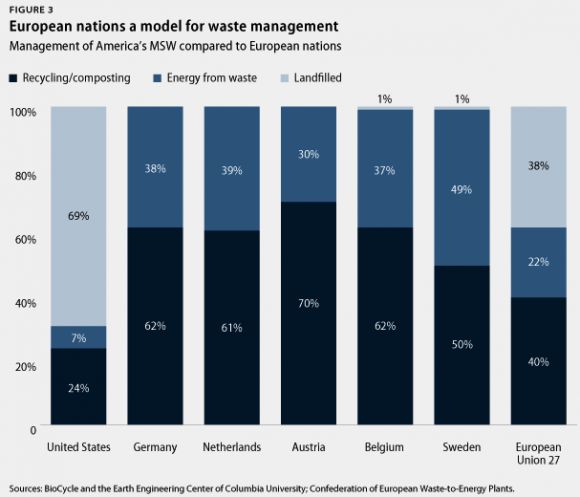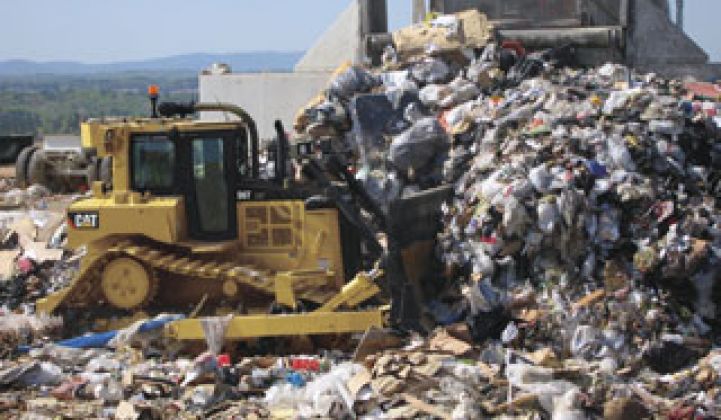America is not very creative when it comes to handling waste. Although recycling rates have improved dramatically over the last five decades as states have implemented requirements and consumers have become more aware, the U.S. is way behind leading European countries.
This chart from the Center for American Progress (CAP) shows how dramatically America differs from European countries that have gotten serious about recycling and turning their waste into energy.

The chart comes from a recent CAP report calling for a national municipal-solid-waste portfolio standard to encourage more energy from waste (EfW), which is currently only at 7 percent of America's total municipal solid waste stream.
Indeed, some countries like Austria, the Netherlands and Germany have virtually eliminated landfilling because of strong recycling and EfW policies. Those policies allowed the EU to cut the amount of waste it sent to landfills by nearly 20 percent between 2001 and 2011 -- contributing to a 34 percent reduction in greenhouse gas emissions from the waste sector since the 1990s.
A large number of landfills in the U.S. -- 560 out of 1,900 -- are using technologies to capture landfill gas and turn it into electricity. While this is a great way to reuse methane emitted from landfills, only about a third of the potent greenhouse gas is actually turned into electricity. The rest of the gas is either flared or isn't recovered at all. This means that landfills rank just behind the natural gas and agricultural sectors in methane emissions.
Landfill gas qualifies as a renewable resource under many state renewable energy portfolio standards. But CAP's Matthew Kasper argues that waste combustion is a better resource, as it prevents trash from being landfilled and results in a far deeper cut in greenhouse gas emissions.
"Landfills, including ones with methane-gas capture, are typically placed on equal or higher standing in renewable programs than EfW," wrote Kasper. "This unintended encouragement of the use of landfills undermines efforts to reduce that reliance, as well as state renewable and greenhouse-gas reduction goals. Such significant financial support for landfills inhibits the growth of solid-waste-management methods such as recycling and EfW further up in the hierarchy."
Although new, highly advanced plants can be up to 85 percent cleaner than EPA air quality standards, burning trash doesn't sit well with many people.
When Arizona allowed a co-op to burn municipal solid waste in place of other renewables, outraged environmental groups said it would encourage dirtier technologies to crowd out solar. The same debate is happening in other states around the country that are encouraging EfW as part of their renewable energy targets. There are now twenty-one states that include EfW in their targets, with some, like Maryland, putting the technology on par with wind and solar.
Putting it at odds with some other groups working on clean energy and environmental issues, the CAP report argues that an EfW standard should be implemented nationwide as part of a broader set of federal renewable energy targets. The EfW standard would be paired with recycling and composting standards, which could also dramatically reduce the waste pouring into America's landfills.
"In order for the United States to begin reducing the amount of waste sent to landfills, increasing recycling rates, and generating renewable energy, a municipal-solid-waste portfolio standard must be enacted by Congress and applied nationwide in order to decrease greenhouse-gas emissions from landfills, and individual states should include EfW in current renewable-energy portfolio standards," wrote CAP's Matt Kasper in the report.
It's an interesting proposal that is just now getting serious consideration. However, with very little appetite for a clean energy standard in Congress, getting any momentum on an additional policy like this is unlikely. And with many environmental groups worried about the impact of EfW, it could create a somewhat contentious debate about the role of trash-based energy if it ever does gain traction.



